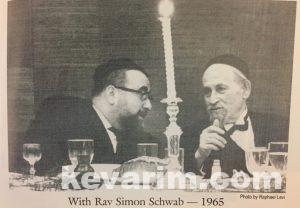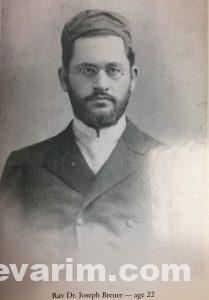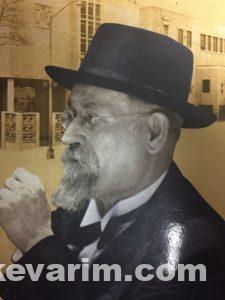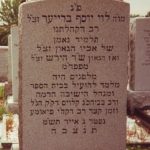Rabbi Levy Yosef Breuer
לוי יוסף ב"ר שלמה זלמן
Chief Rabbi, Khal Adath Jeshurun (KAJ), Washington HeightsDate of Death:
Sat. April 19, 1980 -
Iyyar 3 5740
Anyone with biographical information is asked to please send it in.
See CONTACT page for details. Thank you.
Directions to Kever: King Solomon Memorial Park (West Ridgelawn Cemetery) in Clifton, NJ maintains computerized burial records and will provide a detailed location map upon request. Location: KAJ
Biographical Notes:

Source: Rav Breuer, His Life And His Legacy

Credit: From the archives of Rav Aaron Rakeffet-Rothkoff, Jerusalem


Credit: From the archives of Rav Aaron Rakeffet-Rothkoff, Jerusalem
Bio Information:
The Rav was born in 1882 in Papa, Hungary. His father Rav Shlomo Zalman a talmid of the Ksav Sofer was married to Rav Shamshon Raphael Hirsch, youngest daughter, Sophie. After Rav Hirsch passing in 1888, Rav Shlomo Zalman was selected to replace him as the Moreh Dasrah of the Austrittsgemeinde (secession community) of Orthodox Jews in Frankfurt am Main, known as Khal Adath Jeshurun.
Rav Yosef attended the local yeshiva, Torah Lehranstalt, which his father founded. Upon his fathers passing, in 1926, Rav Yosef was installed as the Rosh Yeshiva of the communal school system.
The Rav immigrated to the United States in 1939 after being arrested by the Gestapo. Once in New York, the Rav took the initiative to start a congregation with the numerous German refugees in Washington Heights, which would closely follow the morale and customs of the Frankfurt community. In addition, he founded Yeshiva Rabbi Samson Raphael Hirsch, a yeshiva elementary school and high school named after his illustrious grandfather. He also founded a teachers’ seminary for girls that would be renamed the Rika Breuer Teachers’ Seminary after his wife’s passing.
Towards the end of his life, the name Levi was added to his own name as a blessing to recover from an illness.
Among the Rav’s philosophical views was the concept of Torah im Derech Eretz which was first introduced in Germany by Rav Hirsch.
« Previous: Rev Yitzchok Isaac LeeserNext: Rabbi Yosef Dover Soloveitchik »







Torah im Derech Eretz was not a new idea, it is found in Avoth 2:2.
The phrase “Derech Eretz” as found in Avot 2:2 refers specifically to ones ability to earn a livelihood (see, Maimonides, Mishnah Commentary at loc and others). In the Hirschian philosophy, the phrase refers to general culture (including science, the arts, and literature) – the hallmark of Hirsch’s reaction to modernity and the Reform movement.
Does anybody know the meaning of the words on the metzaveh a short time rov of the orthdox kehilla in puma
“Maharal, Judah Loew (1525–1609), points out that Derech Eretz is not limited to “earning a living”; rather the concept encompasses hanhaga tiv`it, “operating in the natural world”. Here, Maharal in his Derech Chaim comments on the later Mishna, Avoth 3:20, which discusses the interdependence of “Torah and flour (kemakh)” as well as the interdependence of “Torah and Derech Eretz”. Kemakh, flour, clearly refers to monetary livelihood (with Torah referring to spiritual livelihood). Thus, Derech Eretz refers to more than just “earning a livelihood” and includes the knowledge and skills that facilitate success in the “world of Nature”.” from Wikipedia
For a cemetery map see http://tidesociety.blogspot.com/2013/12/cemetery-map.html
Mo Kennedy:
There are a number of sources indicating that the פיאומע on the matzeiva refers to Fiume, Italy (now Rijeka, Croatia) where Rabbi Breuer z”l was Rav and Rosh Yeshiva for less than a year.
You can get some nice relevant pictures at http://digitalassets.ushmm.org/photoarchives/ by searching for either Joseph Breuer or Breuer yeshiva.
To view a photo of Rabbi Breuer himself, see http://digitalassets.ushmm.org/photoarchives/detail.aspx?id=1097067
reb moishe
thanks is there anywhere where i can find some info on the orthdox kehilla in puma
Other than searching Google, I know nothing more than you. But here are two helpful sites for starters that I found quickly:
http://www.jewishvirtuallibrary.org/jsource/judaica/ejud_0002_0017_0_16761.html
http://en.wikipedia.org/wiki/Jews_in_Croatia
Usually a matzeiva says also the name of the father. Intresting